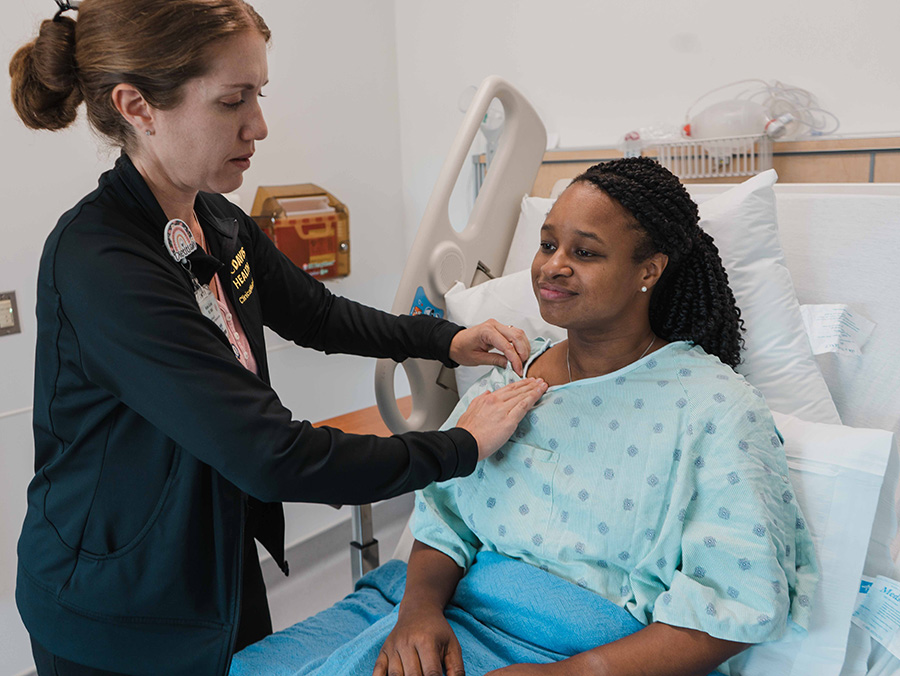Do you know signs of malnutrition?
Malnutrition Awareness Week is September 18-22
During the week of September 18-22, 2023, UC Davis Health is taking part in Malnutrition Awareness Week, an international effort to increase the awareness, diagnosis and treatment of malnutrition in patients.
Now in its 11th year, Malnutrition Awareness Week is an annual, multi-organizational campaign created by the American Society for Parenteral and Enteral Nutrition (ASPEN) to spotlight nutrition’s vital role in health and recovery, reinforce for healthcare professionals the impact nutrition has in medical treatment, and educate the public on the importance of discussing their nutrition status with their healthcare providers.

What is malnutrition and what are the symptoms?
Malnutrition is a deficit of energy and/or protein which results in weight loss, fat and muscle mass depletion, and functional status decline, as well as growth changes in children. Signs and symptoms of malnutrition might include:
- Unplanned weight loss
- Loss of appetite
- Not able to eat or only able to eat small amounts
- Feeling weak or tired
- Swelling or fluid accumulation
While albumin and prealbumin are prognostic indicators of morbidity and mortality risk, these serum proteins are not reliable markers of nutrition status and are not considered diagnostic indicators of malnutrition. UC Davis Health’s approved malnutrition diagnostic criteria for adults and pediatrics are based on consensus statements published by ASPEN and the Academy of Nutrition and Dietetics.
How prevalent is malnutrition and who is most affected?
Malnutrition can occur at any age, body size, or BMI. About 33% of community-dwelling adults have malnutrition or are at risk of developing malnutrition upon admission to the hospital. Of those people who are not malnourished at the time of admission, 1 in 3 will develop malnutrition during their hospital stay.
Older adults are particularly susceptible to malnutrition, with approximately 50% of adults over the age of 65 at risk for malnutrition.
Other at-risk populations include people with long-term health conditions such as kidney disease, cancer or dementia; those experiencing acute diseases or injuries such as sepsis or trauma; or people with social or behavioral factors, such as substance abuse, food insecurity or eating disorders.
Why is it important to raise awareness of malnutrition?
Malnutrition, when unrecognized and untreated, results in longer hospital stays for patients, a two-fold increase of the need for rehab or long-term care, and a 3.4 times higher rate of hospital deaths. In addition to its human toll, malnutrition raises hospital costs by 73% and can cost an additional $10,000 in hospital readmission stays.
Identifying malnutrition is critical in guiding the timing and level of nutrition intervention strategies, which may entail therapeutic diet modifications, enteral or parenteral nutrition support, counseling, or micronutrient status evaluation and supplementation. Studies have shown that nutrition interventions are impactful in reducing overall complications, incidence of pressure injuries, avoidable readmissions, and hospital length of stay.
What can be done by staff at UC Davis Health to fight malnutrition?

Interdisciplinary collaboration is essential to identify and treat malnutrition, from nurses screening patients for nutrition risk at time of hospital admission and healthcare providers collaborating with dietitians to develop targeted nutrition interventions to case managers coordinating access to community resources at time of discharge.
An especially vulnerable population are people with compromised nutrition status who are undergoing surgery. Integrating evidence-based standardized care bundles, such as the Enhanced Recovery After Surgery (or ERAS) protocol, reduces a patient's stress response to surgery which has been shown to decrease surgical complications, shorten hospital stays, speed up recovery, and reduce associated healthcare costs. Nutrition components of an ERAS protocol entail preoperative malnutrition screening, carbohydrate loading prior to surgery, and reduced fasting time.
Future opportunities to both treat and prevent malnutrition include nutrition prehab programs for patients prior to surgery, addressing food insecurity through food prescriptions and partnering with community programs, and improving food literacy through education.




